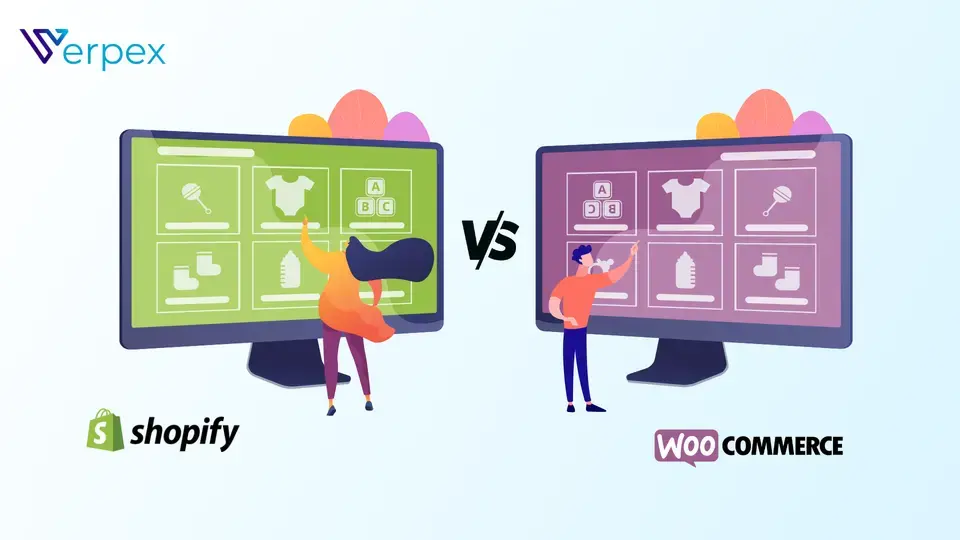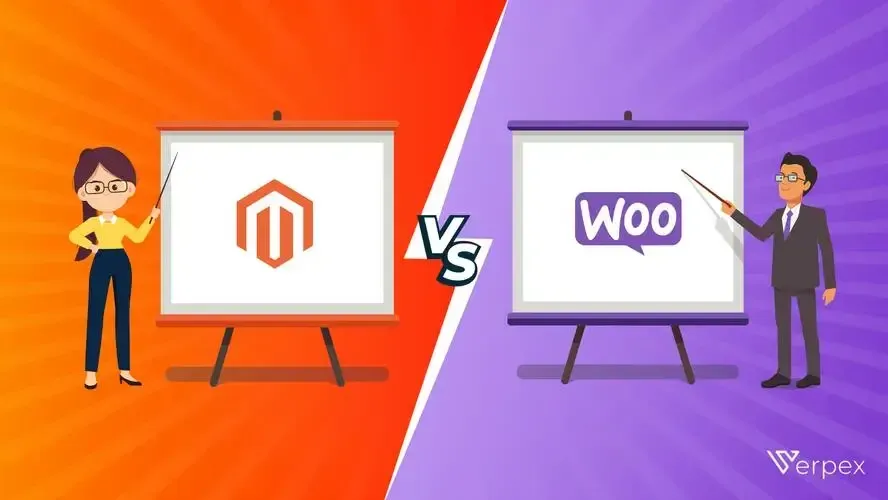Magento and WooCommerce are both hugely popular platforms for creating eCommerce websites. The main difference between the two is that Magento is made for enterprise-level businesses who need extreme customization options, while WooCommerce is a more affordable way to get an online shop up and running — great for smaller business owners.
We will do a detailed comparison between the two and help you make the right choice for your online business.
WooCommerce vs. Magento: Common Features
Magento and WooCommerce are two popular eCommerce platformse and both of them offer a long list of features that allow you to run your online store smoothly and effectively.
Both are open-source platforms and the base versions are completely free. Developers across the globe are continually adding to the source code, making improvements and patching security holes.
Both are self-hosted, meaning you’ll need a web hosting provider like Verpex to host your website.
WooCommerce vs. Magento: Core Difference
The biggest difference comes with scale.
Magento is designed for large businesses, handling thousands of store transactions every hour, and you’ll often find big multinationals using it. This means you’ll need some significant web development skills to get the most out of it.
WooCommerce is much more user-friendly by comparison and has thousands of easy to install extensions to boost your site functionality. Plus, it’s a more affordable way to get a store up and running.
WooCommerce vs. Magento: Point By Point Comparison

Ease of Use
- Magento
You’re going to need some significant web development skills to get the most out of Magento as many extensions require coding knowledge.
- WooCommerce
As a WordPress plugin, WooCommerce can be installed in one click. Plus, many of the add-ons and extensions have easy install and detailed guides to get you started.
Verdict
As Magento is just so customizable it can be an intimidating platform for newbies. If you want a gentler learning curve, definitely go for WooCommerce.
Build Time
- Magento
While the base version of Magento has enough functionality for a basic store, the majority of users will need to plan, design and implement a web design project to get the most out of the platform.
- WooCommerce
You can have a basic, but functional, store straight out of the box with WooCommerce, and make additions in your own time. Plus, you can download drag-and-drop page builders to make extra changes.
Verdict
Depending on the complexity of your store needs, it could take days to weeks, or even months, to get everything you need using Magento. WooCommerce has you operational much faster.
Design and Themes
- Magento
There are hundreds of different themes offered by Magento and third parties. Plus, you can make any change you’d like but may need the help of a web developer.
- WooCommerce
WooCommerce has thousands of preset designs and themes on offer. They’re a little more difficult to adapt, but with so much choice you’re bound to get a professional-looking store.
Verdict
It’s very difficult to choose between the two here as both have an excellent range of themes. We have to call it a draw.
Sales Features

- Magento
Magento has an incredibly impressive range of sales tools, including marketing analytics and tracking. Plus, you can add almost anything to the core software
- WooCommerce
WooCommerce too has a huge range of features and sales extensions, just not quite as many as its rival.
Verdict
It’s a close-run thing, but Magento just takes the lead here. It has a few more built-in features and just about any sales tool you like can be added.
Plugins and Integrations
- Magento
With a range of both free and premium plugins, as well as huge scope for customized development, Magento certainly impresses.
- WooCommerce
Not only do you have access to thousands of third-party extensions, but you’ll also get your hands on the full WordPress library too.
Verdict
While Magento is just that little bit more customizable, WooCommerce makes up for it by offering a huge variety of choices. The best across both platforms include social media integrations, multi-channel selling and a host of shipping tools and payment processors.
Marketing Tools

- Magento
Magento comes with a built-in marketing menu to manage promotions and monitor customer communications. Plus, you’ll find a range of excellent plugins and extensions to boost your marketing range.
- WooCommerce
As a WordPress plugin, WooCommerce can draw on that platforms pool of marketing tools like blogs, automated email integration and short codes
Verdict
Magento is a real powerhouse of marketing and takes our top spot. That’s not to say WooCommerce can’t compete, because it too is packed with great marketing features. It should have more than enough for most websites, but big organizations will want to try Magento.
Payment Options and Transaction Fees
- Magento
Magento offers a range of built-in payment features including bank transfer, credit and debit cards, PayPal and authorize.net, alongside dozens of other methods through add-ons
- WooCommerce
WooCommerce has all of the same payment methods as Magento, with the addition of Apple Pay
Verdict
The two platforms are very similar, and neither will charge their own transaction fees other than those set by the payment platform. However, WooCommerce wins this round for the addition of Apple Pay.
SEO
- Magento
Mangento lets you create SEO-friendly URLs, configure meta tags and titles and optimize your site for speed to rank higher in Google
- WooCommerce
WooCommerce has dozens of specialized SEO plugins that are more than a match for Magento. Plus, as a WordPress plugin itself, it’s already optimized to rank high in search engine results.
Verdict
There’s really very little to choose between the two here. Magento offers loads of customizable SEO options, while WooCommerce has SEO compatibility built-in from the outset.
Security

- Magento
Magento is one of the most secure web builders on the market coming with two-factor authentication and PCI compliance right out of the box. Plus a managed Verpex service will net you a free SSL certificate and 24/7 server monitoring.
- WooCommerce
The base version of WooCommerce isn’t PCI compliant, but you can make it so through add-ons. Plus, like any of our managed hosting plans you get top-notch additional security.
Verdict
As your data host, Verpex will take care of a lot of your security concerns, but the extra additions thrown in by Magento make it our top choice.
Customer Support
- Magento
Magento doesn’t have its own customer support team, but you can find a range of guides and blogs online. Luckily, as your Magento data host, Verpex will be on hand to cover any queries you might have.
- WooCommerce
WooCommerce has its own ticket submission platform, which is unusual for a free platform. Plus, hosting experts are on hand to help you choose the best plugins for your site.
Verdict
As a more popular platform, it’s simply easier to find more information about WooCommerce’s functions online. Plus, the online ticketing system is an added bonus.
Pricing
- Magento
While Magento is a free piece of open-source software, you’ll need considerable resources to build a fully functioning site. Average costs can be as high as $15,000.
- WooCommerce
WooCommerce is much more accessible in terms of price. The source software is free, and add-ons generally cost around $40 - $50 each, so it’s up to your preferences how much you want to spend.
Verdict
WooCommerce is the clear winner, offering sites with great functionality for a very reasonable price. However, if your turnover is in the thousands of dollars per day, you might get more value from Magento.
Customization

- Magento
Magento is the king of customization. We can’t think of a platform that has it beat. With the right coding skills you can tweak every single aspect of your store.
- WooCommerce
While WooComemrce has a huge range of extensions and customization options, it simply can’t compete with Magento. It’s certainly easier to use, but you can’t do as much.
Verdict
There’s no contest when it comes to customization, and Magento simply allows you total freedom to tweak every aspect of your site.
Business Size
- Magento
Magento is made for the big boys and has a number of multinational corporations to its name, such as Ford Motors, Coca Cola, and HP. While it can handle smaller sites, it’s best suited for stores with thousands of sales per day.
- WooCommerce
WooCommerce certainly has some impressive scalability but is a much better option for smaller and medium-sized businesses.
Verdict
Magento has been designed to handle huge daily customer loads and is the clear choice for any large enterprise.
When To Migrate from WooCommerce to Magento and Vice Versa
- Your customer base has grown exponentially
If you’re getting more customers than you can handle, it might be time to consider the switch up to Magento
- You’re downsizing
Magento can be a costly platform to develop and maintain. If you’re downsizing or have a small customer base, you should switch to the user-friendly WooCommerce
- You want a more customized store
If you want to amend every aspect of your online store and make it perfect, you might want to switch to Magento for more customization options.
What Other eCommerce Builders are There?
WooCommerce and Magento are not the only popular options for website builders on the market. There are a lot of website builders that can help you make an online store that stands out. They're easy to use and can help you create a unique website for your business. Such website builders include: 3dcart, Weebly, and Squarespace.
WooCommerce Vs. Shopify
Shopify is a great alternative for small businesses looking for an immediate pick-up-and-play eCommerce store. The subscription model and built-in hosting are perfect for organizations looking for affordability and simplicity.

Summary
Both Magento and WooCommerce offer very different functionality, catering for different groups of customers.
Magento is by far the best choice for large enterprises looking to process huge numbers of sales each day.
WooCommerce on the other hand is a great platform for those looking for some freedom to develop their stores, but would also like it to be intuitive and user friendly.
Both WooCommerce and Magento allow you to create unique, custom websites with a wide range of features. You can add new functionality and components over time, making your site exactly what you need it to be. There are thousands of add-ons available for both platforms, so you can really tailor your site to your specific needs.
Frequently Asked Questions
How easy is it to switch between WooCommerce and Magento?
At Verpex we can host either site no problem. However, you’ll need to be aware that there can be some difficulties due to the customizable nature of Magento, and functionality could be lost.
Can I host multiple stores with Magento?
Yes, you can set up as many different online stores as you like, but bear in mind this could be costly in terms of development.
How much server space and bandwidth do I need for a Magento store?
Like any type of hosting, this will depend on the size of your customer base. You should have an idea of how much traffic your site is/will receive, but you can chat to one of our service agents to discuss hosting plans.
Will I get 24/7 support?
Yes, whether you choose to host Magento or WooCommerce, Verpex can offer you round-the-clock customer support.

I've been navigating the web hosting waters for years now. As the Chief Editor at Verpex, I team up with some awesome writers to dish out the good stuff on hosting. Got a Master's in Journalism, so I always have an eye out for quality. Whether you're just dipping your toes or you're a seasoned surfer, I'm here to make everything web hosting feel like a breeze
View all posts by Julia Lozanov



















